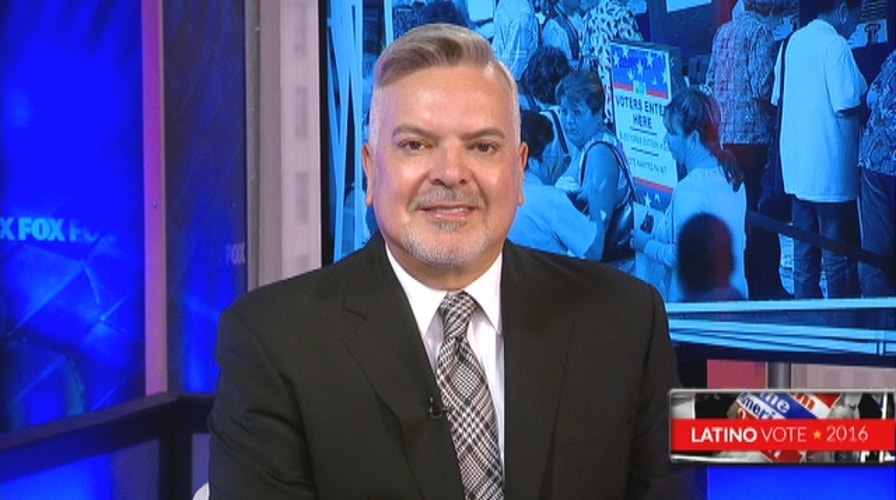DNC's Henry Muñoz on Nevada caucus
Democratic National Committee Financial Chair Henry Muñoz III speaks to Fox News Latino.
New York City – Yes, there is an election for president.
And yes, there is the very critical Nevada Democratic caucus happening on Saturday.
But often overlooked, says an influencer in the Democratic Party, is another very important race in Nevada – the one for the U.S. senate seat being vacated by retiring Sen. Harry Reid, a veteran in Congress and the Senate minority leader.
The front-runner so far seems to be former Nevada Attorney General Catherine Cortez Masto, who has Reid’s backing.
Democratic National Committee Financial Chair Henry Muñoz III calls it, quite simply, one of the most important races not only in the state, but in the nation as well as for Latinos.
“There are 27 million Latinas in the United States,” said Muñoz, a Texas native, in an interview with Fox News Latino, “and not one Latina in the U.S. Senate.”
Not only is there not a single one now – there never has been a Latina U.S. senator in the history of this country, Muñoz notes.
“I would encourage Latinos to pay attention to this race,” said Muñoz, who years ago set out to elevate the involvement of Latinos in the political playing field, particularly where Democrats are concerned, by getting more to become campaign donors, to run for office, and to vote.
“Catherine is the first of what I hope will be the first of an increasingly strong line of Latina leadership who have the potential to be elected to office. Catherine is important both symbolically and in real time.”
Muñoz, eloquent and elegant, is known for his lifelong dedication to Latino empowerment.
He has helped establish museums for Latinos, is a major philanthropist, and is a professional architect.
He wants to take the long-repeated notion of Latinos as the Sleeping Giant and get that Latino populace to wake up and seize the day.
In the 2012 presidential campaign, he emerged as a formidable political fundraiser.
A group he was associated with, the Futuro Fund, collected some $30 million for President Barack Obama’s re-election. As in that venture, actress Eva Longoria partnered with him in newer group called the Latino Victory Project, which seeks to support Latinos running for office, among other things.
Muñoz and Longoria made headlines in the past presidential election for getting numerous Latinos to get involved as campaign donors.
Muñoz looks forward to Latinos playing a key role in the Feb. 20 Democratic caucus in Nevada, where recent polls show former Secretary of State Hillary Clinton essentially deadlocked among likely participants in the caucus.
“The Democratic Party is working in all 50 states” to get minority voters involved, he said. “But this state is really important for us because it’s the first state to reflect the diversity of America as a country.”
“People have a misconception of Latinos in this country,” he said, “that we don’t vote, that we’re relaxed (about elections) when it comes to that kind of decision-making.”
“I think the Nevada caucus will show that’s not the case.”
The 2016 election has shown, if nothing else, that it defies predictions and historical patterns.
“One of the byproducts of this moment in history is that people are motivated,” he said. “This may be the first presidential election that is truly decided by the Latino vote.”
He said that after 2012, the GOP realized it must change its rhetoric about Latinos, immigration, and other issues that personally touch them, directly or indirectly.
Many people echoed that belief, after the bruising defeat of GOP presidential candidate Mitt Romney that in part, at least, was seen as a result of the overwhelming support that Obama got from minorities, including Latinos, who gave him 71 percent of their vote.
“People should pay attention to the people who speak for them,” he said.
Muñoz recalled how his father, a prominent labor leader in Texas, said to him: “A president should be a uniter-in-chief. I think we have the opportunity [in 2016] to decide whether our president should be the uniter-in-chief or divider-in-chief.”
Of the recent polls showing Sanders, 74, and Clinton, 69, neck and neck in Nevada, Muñoz said that’s a healthy thing.
“I’ve spent a lot of time traveling the country in the last year,” Muñoz said. “I don’t think anybody wanted not to have a [competitive] race for president of the U.S.”
As for Nevada, where Latinos are more than 14 percent of the electorate, and where the presidential campaigns have been courting them, Muñoz says it will offer a case study for the rest of the country.
“We’re going to see many [examples] of how you engage [Latino] voters on the ground, and that will benefit both candidates,” he said. “The Latino community will make a difference in Nevada.”





